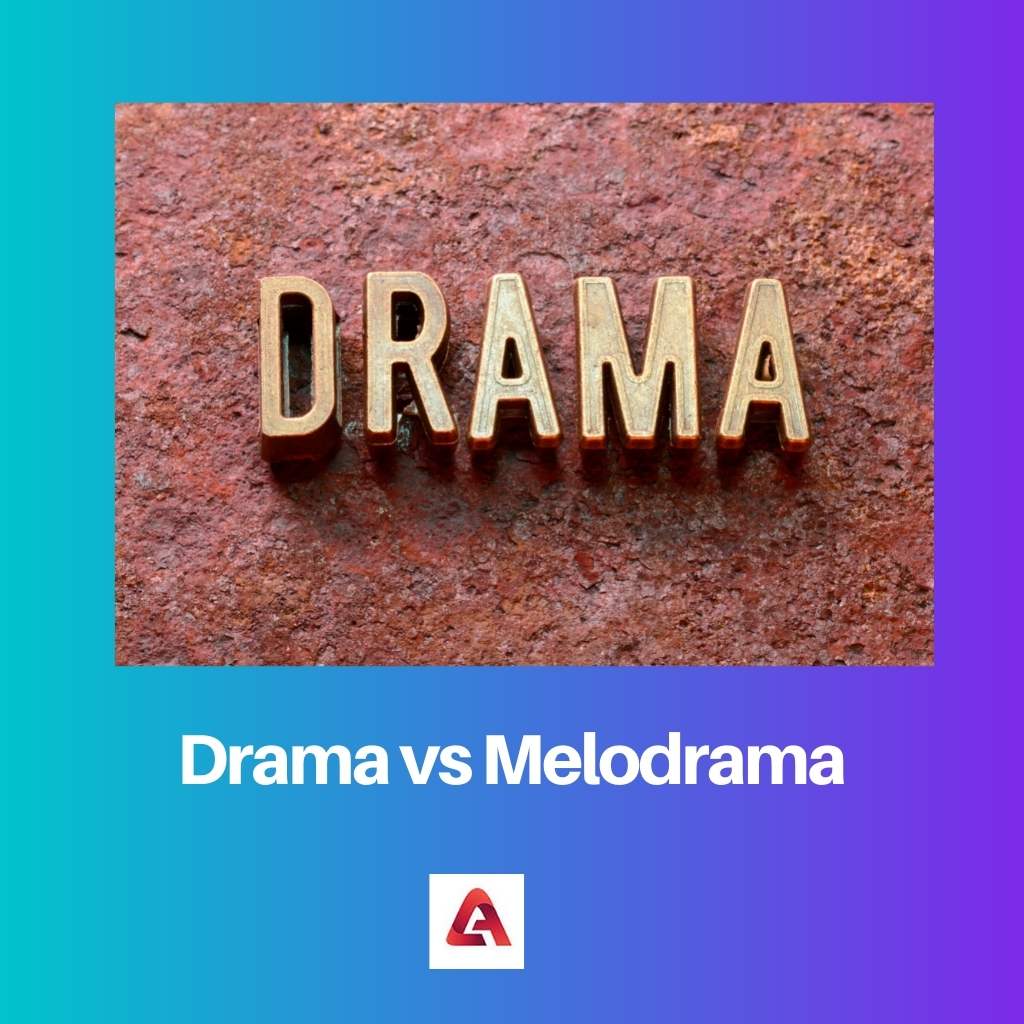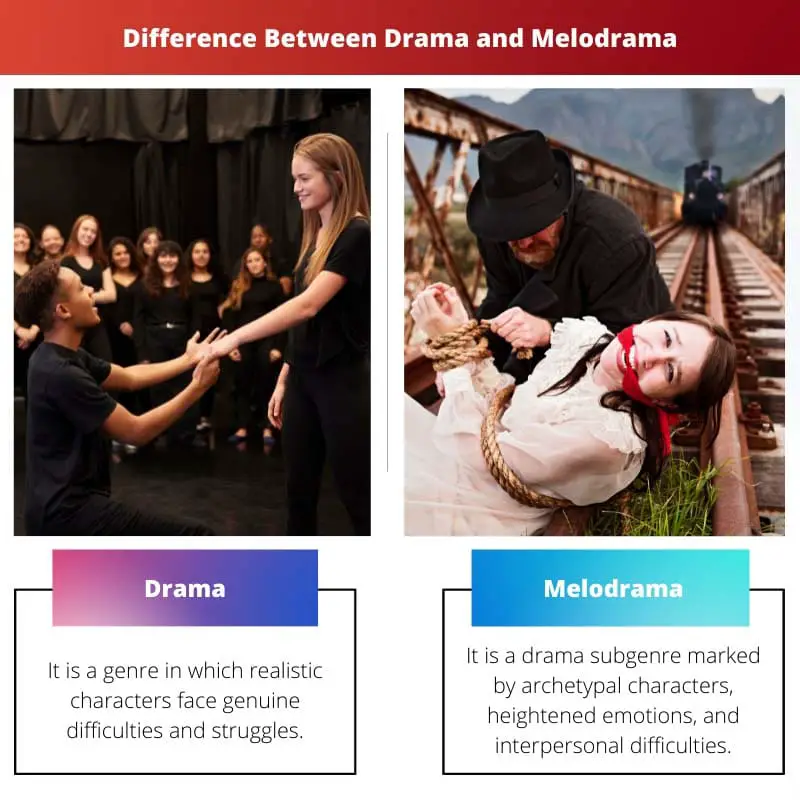When an individual watches a drama, a movie, or a TV series, they sometimes get the impression that the performers are overreacting and overacting.
This is when one gets the impression that the characters’ actions are attempting to appeal to their emotions but in an overdone way.
The drama becomes melodrama or overblown drama when the performer makes sweeping movements and displays overdone emotions.
Key Takeaways
- Drama is a broad literature, theater, and film genre that focuses on realistic conflicts and human emotions, while melodrama is a subgenre characterized by exaggerated emotions and plotlines.
- Melodramas rely heavily on stereotypical characters and sensational elements, whereas dramas present more nuanced character development and storylines.
- Dramas explore various themes and subjects, while melodramas focus on moral dilemmas, clear-cut villains, and heroes.
Drama vs Melodrama
Drama refers to a serious and realistic work that explores complex themes and emotions, based on real-life situations. Melodrama is characterized by exaggerated emotions, stereotypical characters, and a predictable plot, aiming to evoke strong emotional responses from the audience.

The term “drama” comes from the Greek word “action”; in a technical sense, drama is the process of conveying anything based on a concept via action and speech.
It also uses stage decorations, costumes, sound effects, and visual effects to transmit a tale to a captivated audience in a broader sense.
Melodrama is a theatrical production in which events, plots, and characters are sensationalized to evoke intense emotional responses in the audience.
Melodramas are characterized by overblown narratives rather than characterization in literature, theatre, and film. Characters in melodramas are frequently cast in stereotyped roles.
Exaggerated character emotions and performances are frequently used to sensationalize conflicts.
Comparison Table
| Parameters of Comparison | Drama | Melodrama |
|---|---|---|
| Definition | It is a genre in which realistic characters face genuine difficulties and struggles. | It is a drama subgenre marked by archetypal characters, heightened emotions, and interpersonal difficulties. |
| Plot | Realistic. | Emphasized and escalated. |
| Conflict cause | A rational and reasonable sequence of events. | The character connections. |
| Characters | Genuine personalities and qualities are given which are complex and one-of-a-kind. | Stereotyped roles. |
| Theme | Wider concepts. | Interpersonal and highly emotional themes. |
What is Drama?
Drama is a literary genre in which characters face real-life challenges or hardships. They’re serious stories about everyday people in a fight with themselves, society, or natural forces.
Because it encompasses such a wide spectrum of material, drama is one of the most popular literary genres.
Crime, legal, romantic, historical, horror, melodrama, and other subject-matter themes can be found in each of these literary works.
Current events, societal troubles, corruption, racial prejudice, religious intolerance, poverty, political unrest, class divides, mental illness, sexual inequity, drunkenness, and other combustible concerns are all examples of dramatic subjects.
Comedy, tragedy, tragicomedy, and melodrama are the four basic forms of drama. These sorts emerged in various eras, yet they all have their qualities. All of them, however, have a role in modern culture and should be respected.
Dramas rely largely on a spoken conversation to keep the viewer informed about the characters’ sentiments, personalities, goals, and intentions.
Because the audience witnesses people in a drama living out their experiences without any explanation from the author, playwrights frequently use soliloquies and asides to generate dramatic suspense.
The drama may also be a learning tool, and one can use it to improve problem-solving abilities, expand their creativity, get a better knowledge of the world around them, or learn to empathize with others by taking on the role of that person and experiencing what they are going through via performance.
It’s frequently employed in treatment for persons who can’t connect with their feelings or grasp social conventions, isolating them from the rest of the world.

What is Melodrama?
Melodrama is a broad term used in theatre and cinema to describe the use of exaggerated acts to play on people’s sentiments and emotions, frequently suppressing character development in favour of portraying the character as a funny cliché.
Melodrama is a genre that originated in France during the French Revolution.
The phrase itself, which means “music drama” or “song drama,” is Greek in origin but came to the Victorian stage via French.
Melodrama also frequently uses mythological figures that overtly symbolize ideas and concepts, such as Satan as the pinnacle of evil, or an angel as the perfect picture of purity and virtue, as the major focus of the performance.
Melodrama is spectacular and intended to elicit strong emotional responses, thus, precise characterization takes a back seat.
Melodrama’s core themes include tragedy, unrequited love, and loss. Melodrama got its name from the fact that it used music in its presentations.
Fight sequences, for example, were frequently set against orchestral compositions that were built to crescendos at just the appropriate moments.
Alternatively, in a romantic moment, the performers may be accompanied by a delicate, beautiful song emphasising love and joy.
This was done to make a lasting effect on the audience and add another dimension of emotion to the performance.

Main Differences Between Drama and Melodrama
- Drama is a literary genre in which realistic characters face genuine difficulties and hardships. Melodrama, on the other hand, is a drama subgenre marked by archetypal characters, heightened emotions, and interpersonal difficulties.
- The drama character’s dilemma is real. Melodramas emphasise and escalate conflicts to evoke a larger emotional reaction from the audience.
- A rational and reasonable sequence of events leads to the dispute in dramas, whereas in melodrama, the character connections, rather than a bigger force, are frequently the source of conflict in these works.
- Characters in a drama are given genuine personalities and qualities that represent the human population’s diversity. Dramatic characters are frequently complex and one-of-a-kind, whereas comedy characters are more generic. Characters in melodramas are frequently cast in stereotyped roles. The six stock characters spawned these archetypal roles. The names given to these six characters are the villain, the sensitive hero, the persecuted heroine, the clown, the loyal friend, and the villain’s collaborator.
- Dramas focus on wider concepts and issues such as injustice, inequality, corruption, and social conventions, but Melodrama’s original plays tend to have limited topics. These stories have interpersonal and highly emotional themes like love and family.

- https://www.tandfonline.com/doi/abs/10.1080/00335638909383862
- https://link.springer.com/chapter/10.1007/978-1-349-19798-9_5

I appreciate the thorough analysis of both drama and melodrama. The insights and comparisons provided are commendable.
This is a thought-provoking piece. A clear distinction of what drama is and what melodrama is meant for, I appreciate the detailed analysis and the comparison between the two genres.
The piece is outstanding in its thorough explanation of what drama and melodrama are. It also provides a detailed comparison between the two, which assists readers in understanding the essential differences. Admirably written, and incredibly informative.
Every aspect of what drama and melodrama are is thoroughly explained. The insights and comparisons between the two genres are outstanding.
A truly educational article. But a slightly more concise approach could make the piece even better.
A comprehensive description but it can be a little verbose.
The article provides a detailed and valuable comparison between drama and melodrama, considering form and themes, shedding light on both genres, making it a must-read. It’s a bit repetitive with the explanation and could be a bit more concise.
The article is exhaustive but could benefit from a more concise approach. The repetition takes away from the great points it makes.
Highly educational but a little verbose at times.
The article explains the concepts of drama and melodrama with such depth and detail, this is a quality article which strives to help people understand the key points with clarity and precision.